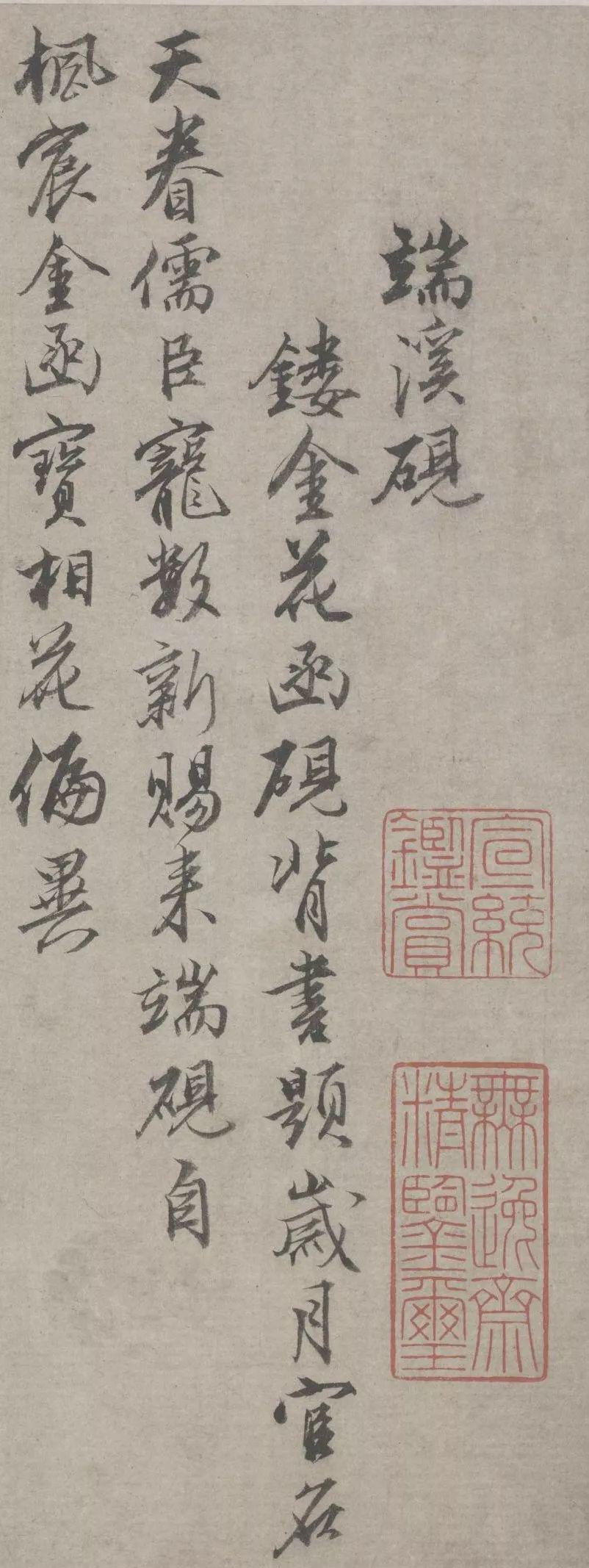Shen Cang's book was written in the fifth year of Xuande (1430), the strokes are handsome and vigorous, which is consistent with the beautiful style of Shen Cang's cursive writing, and integrates the dignified and rounded style of the "Tai Ge body", with an elegant and bright charm. This volume is composed of five poems of seven words and laws, entitled "Duanxi Yan", "Long Xiang Mo", "Golden Flower Notes", "Yellow Seal Pen", and "Beacon Mountain".
Shen Cang's cursive writing is mature and skillful, and he is known as the "Grass Sage" and is famous for a while. Among them, "Zhi Xiao'an Poetry" is his classic. Shen Cang is erudite and versatile, likes to carry backwards, has a high character, is informal, and in his later years he is tired of writing and likes to walk grass.
Among Shen Cang's many famous works, his "Liangwu Emperor Cursive Form" is the most famous, the pen is very strong and steep, the twists are sharp, and the whole chapter grass is mixed with the present grass, but the natural nature is natural, the look is attentive, and the freedom is unrestrained. Due to the rate of the chapter grass, the words are independent, rarely continuous, but the line is extremely flowing. Therefore, Wang Shizhen called him "Zhang Fa Youjing, enough to call The Minang Palace into the Room".
Local magnification to appreciate
Attached is a long roll
▼

Shen Cang's "Five Poems of Seven Sayings"
Long roll appreciation
Shen Cang (1379~1453), also known as Minwang, was a native of Huating County, Ming songjiang Province, and the younger brother of Shen Du. Good and true, cursive, flowing and vigorous, a family of its own. Especially longer than poetry, there are more than 2,000 poems. At the beginning of Yongle, he and his brother Du colleagues in the secret cabinet, the degree is Hanlin Bachelor, The Cantonese is the Bachelor of Attendants, and ren Xian is known as the Bachelor of Size and the Second Shen. The four dynasties of Licheng, Ren, Xuan, and Ying were all specially favored. Since the death of his brother [mò], all jade books and gold janes, national large-scale productions, have produced japonica pens. Gradually relocated to Dali Temple Shaoqing, and returned with his brother Zizao. Sexual filial piety, Bo Zhong cohabitation, duly brother, people think it is out of reach. Especially humble and humble, good rewards are thrown after advancing. He is sleek and disdainful, so he calls himself Jian An. There are "Cursive Thousand Character Scrolls", "Cursive Ancient Poetry Scrolls", "Liangwu Emperor Cursive Scrolls", "Reconstruction of Huating County Governance" and so on. Author of "Manuscripts of Jian'an Poems".
Shen Cang became an official because of his good writing. The calligraphy of Song Pu and Song Ke in the early Ming Dynasty, the cursive writing line is mature, and it is known as the "Grass Sage", and its name is good for a while. His "Liangwu Emperor Cursive Form" is very strong and steep, the twists are sharp, and the whole chapter grass is mixed with the present grass, but it is natural and natural, full of attention, and free and unrestrained. Due to the rate of the chapter grass, the words are independent, rarely continuous, but the line is extremely flowing. Therefore, Wang Shizhen called him "Zhang Fa Youjing, enough to call The Minang Palace into the Room".
He is erudite, fond of being a latecomer, of high character and informal. In his later years, he was tired of calligraphy and liked to walk grass, and won the three ambiguities of Song Zhongwen and Chen Wendong. The people who asked for words outside the door were often continuous, and they were longer than poetry, and at the age of 70, they resigned from the government and returned to their hometowns, and wrote "Jian'an Poetry Manuscript", which has more than 2,000 poems, and the more famous calligraphy works are "Thousand Character Scrolls" and "Rebuilding the Monument of Huating County Governance".
The graphics and text originate from the Network, if there is infringement, please contact to delete!